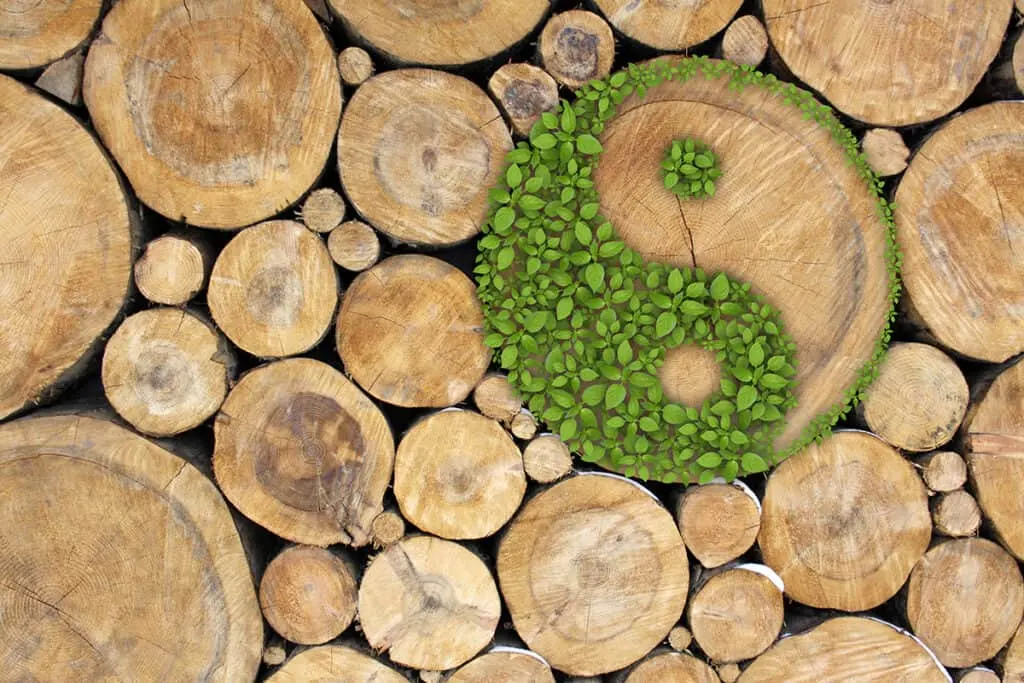The concept of yin and yang energy is one of the foundational principles of feng shui.
Essentially, yin and yang are opposing forces – dark and light, feminine and masculine, passive and active.
Feng shui teaches how to use yin and yang in any space so that it is balanced, harmonious, and healthy.
In this article, we will explore the concept of yin and yang in feng shui in more detail.
We will discuss how to identify yin and yang energies in your home, how to balance them, and how to use feng shui principles to create a harmonious living space.

What is Yin and Yang in Feng Shui?
In Feng Shui, Yin and Yang represent two opposing forces that are interconnected and interdependent.
Yin is associated with feminine energy, while Yang is associated with masculine energy.
Yin energy is slow, cool, wet, and dark, while Yang energy is fast, hot, dry, and bright.
The concept of Yin and Yang is based on the idea that everything in the universe is made up of these two opposing forces, and that achieving balance between them is essential for good health and well-being.
One of the fundamental concepts behind why feng shui works is that it considers the balance of yin and yang in not just your home or office, but also in your life as a whole.
After all, your home, office, or business doesn’t exist in a vacuum.
How you feel about any environment will be greatly affected by how your life is working outside of it.
If your life outside of your home is very active, stressful, and busy (Yang) for example, it might feel best to you for your home to be more restful, peaceful, and calm (Yin) and vice-versa.
Balancing yin and yang means looking at every aspect of your life and how you’d like it to work for you.
That means that energy will flow well in all areas of your life inside and outside of your home.
You’ll have plenty of energy to do everything you want to do, but you’ll also sleep well at night.
You’ll have plenty of money coming in so that you are able to pay for things easily (there’s flow in and flow out.)
In other words, your life will feel balanced and harmonious.

Yin Energy
Yin is associated with:
- Feminine energy
- Rest and relaxation
- Peaceful energy
- Sleep
- Receiving
- Curves
- Soft
- Cool
- Wet
- Dark
- Introversion
- The moon
- Still water
- Feeling stuck
- Calming colors, like blue, black, and green
Yang Energy
Yang is associated with:
- Masculine energy
- Activity and movement
- Stress and being busy
- Light and Bright
- Active energy
- Work
- Exercise
- Electronics
- Making things happen
- Hard angles
- Hot
- Dry
- Extroversion
- The sun
- Flowing water
- Forward momentum
- Growth
- Active colors, like orange, red, and yellow

Understanding How to Use Yin and Yang in Feng Shui
Most of the time, it’s best to balance yin and yang energy in your home.
This creates a positive flow of energy and helps your life feel happy and calm.
One of the best ways to do this in your home is to remember that each room of your home serves a different purpose.
So while it’s important to balance energy in each room, it’s more important to consider how you USE the room.
For example, rooms that are used by everyone in your family, like kitchens, dining rooms, playrooms, and living rooms are more active (yang) rooms.
Most of the time, these rooms are used for activities you do together, which means that they will feel better if they are energetic and lively.
Rooms that are used for rest and relaxation (yin) on the other hand, will feel better if they are more calm and more peaceful.
Bedrooms, bathrooms, dens, and meditation rooms, are generally reserved for solo activities that require rest and concentration.
If there is a mismatch of energy, it can cause frustration, arguments, and even disrupt sleep and concentration.
A bedroom full of yang energy, for example, might cause insomnia and racing thoughts.
Family rooms full of yang energy might cause tiredness and low energy for everyone who spends time there.
And if individual rooms become too unbalanced, it can also cause problems.
Shared spaces with too much yang energy, for example, can cause arguments, stress, and frustration.
Or bedrooms with too much yang energy might cause you to sleep too much or to always feel tired.
Just like with the five elements, every room should contain a little bit of each, and be slightly skewed towards the room’s overall use and mood.

How to Balance Yin and Yang for Good Feng Shui
Balance Your Home’s Energy Overall as Well as Room-by-Room
Balance is key when it comes to incorporating yin and yang in your home.
Make sure to consider the amount of yin and yang in your entire home.
Then go through each room and add a little of each, with the overall balance being skewed to the use of the room. Active rooms should have a bit more yang energy.
Restful rooms should have a bit more yin energy.
Use Yin and Yang Colors
Colors are an important part of feng shui.
Use yin colors, such as blue or green, to create a calming atmosphere.
Yang colors, such as red or yellow, can be used to add energy and excitement to a room.
Incorporate Yin and Yang Shapes
The shapes of objects in your home can also affect energy balance.
Yin shapes, such as circles or curves, create peace and calm.
Yang shapes, such as triangles or squares, can add movement and momentum.
Use Yin and Yang Materials
The materials used in your home can also affect the energy flow.
Yin materials, such as wood or fabric, create a restful, grounding environment.
Yang materials, such as metal or crystals, can add interest and drama.
Add Yin and Yang Elements
Adding yin and yang elements to your home can help balance the five elements.
Yin elements, such as water or plants, create a calming effect.
Yang elements, such as fire, candles, or electronics, grab your attention and keep the energy high.
Position Furniture According to Yin and Yang
The placement and uses of furniture can also be either yin or yang.
Yin furniture, such as soft chairs or sofas, should be positioned in quiet areas of the room.
Yang furniture, such as tables or desks, should be positioned in active areas of the room.
Yin and Yang Artwork and Decor
The artwork and decor in your home can also affect yin and yang.
Yin artwork, such as landscapes or water scenes, are calming and peaceful and go best in bedrooms and bathrooms.
Yang artwork, such as bold patterns or bright colors, can be used in active spaces to increase action and momentum.

Yin and Yang in the Bedroom
In feng shui, your bedroom is a place for rest, relaxation, and romance.
Use yin elements, such as soft lighting or calming colors, to create a calming atmosphere.
Yang elements, such as bold patterns or bright colors, should be used sparingly.
Yin and Yang in the Kitchen
In feng shui, your kitchen is a place of nourishment and energy.
Use yang elements, such as bright colors or bold patterns, to create an energizing atmosphere.
Yin elements, such as calming colors or soft lighting, should be used sparingly.
Yin and Yang in the Bathroom
According to feng shui, your bathroom is a place for good health, cleansing energy, and relaxation.
Use yin elements, such as soft colors or soft lighting, to create a calming atmosphere.
Yang elements, such as bright colors or bold patterns, should be used sparingly.
Yin and Yang in Active Rooms
Shared rooms in your home, like living rooms, family rooms, playrooms, and game rooms, are used to strengthen family relationships.
Balancing yin and yang energies in these rooms can create harmonious relationships for everyone in your home.
The yin or yang energy of the room should be slightly more yang, to keep the energy of the room positive and active.
Just make sure it’s not overly yang, because that can cause frustration and arguments.
Yin and Yang Balance Can Change Over Time
One thing to keep in mind when considering yin and yang in feng shui, is that the balance of energy in your home can change over time.
As your needs change, so will the balance of yin and yang in your life.
When life is stressful, you might find that you need more yin energy.
When life is boring, you might find that you need more yang energy in your home to spice things up!
As with all things in your home (and in feng shui,) the energy will evolve.
When you’re open to change, the energy of your home will reflect the flow of energy in your life.
Knowing how to use yin and yang to balance energy means everything in your life will work more smoothly, and you can use feng shui to adjust the flow any time you need to.
Now that you know everything you need to know about yin and yang in feng shui, you might also want to know:
- What Are The 5 Elements Of Feng Shui?
- feng shui color meanings: using color energy in your home
- Everything You Need To Know About Chi In Feng Shui
- Feng Shui Principles: Feng Shui Do’s and Don’ts for the Home


